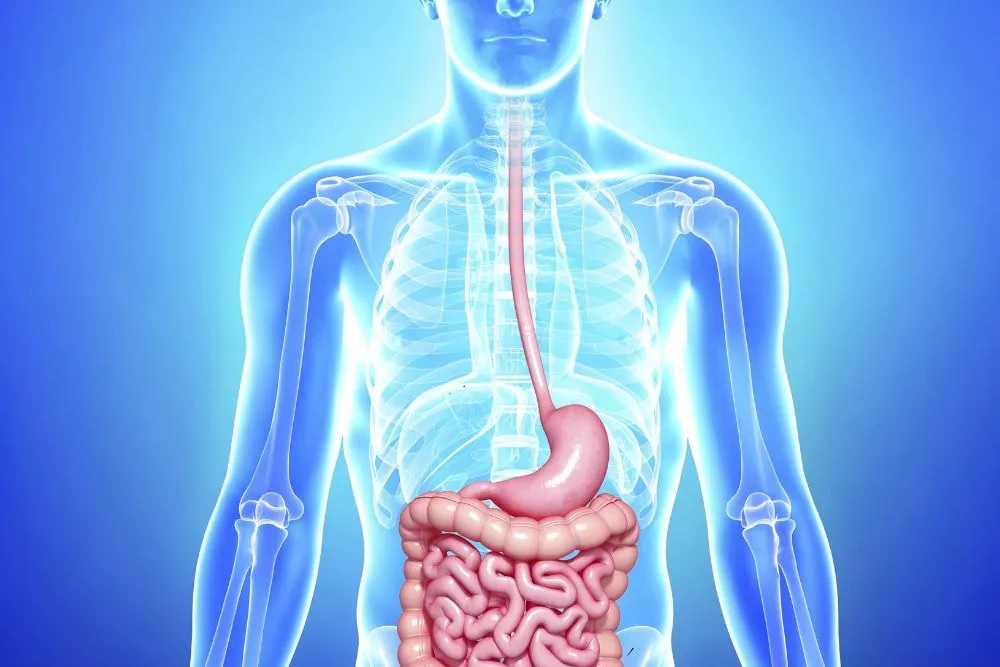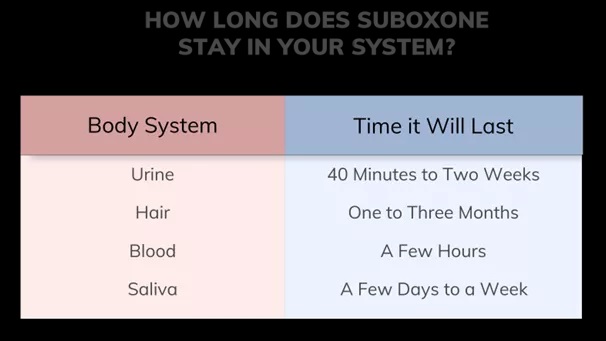Although the effects of suboxone last for only a day, suboxone can stay in your system for anywhere between five to fourteen days depending on various factors. Suboxone is a drug used today to help individuals who are struggling with opiate addiction or dependence. Interestingly, suboxone’s original use was not specifically to help treat addiction. Suboxone is actually comprised of two drugs — one being buprenorphine and the other naloxone.
How Long Does Suboxone Stay In Your System: Suboxone's Half-Life
When trying to understand how long suboxone stays in one’s system, it’s important to understand what a half-life is. A drug’s half-life is essentially the time frame of how long it takes for the concentration of the drug to become reduced to 50% or ½. For example, if you have a 50 mg drug with a half-life of 60 mins, it would be estimated that after 60 mins from taking the 50 mg drug, only 25 mg remains [1]. To determine the Suboxone half-life, which has two active components — buprenorphine and naloxone, we have to pay attention to the half-lives for both of these drugs.
In healthy people:
- Buprenorphine’s half-life elimination ranges from 24 to 42 hours
- Naloxone’s half-life elimination ranges from 2 to 12 hours
When looking at this together, one can determine that the longest suboxone half-life will be approximately 42 hours. Generally, suboxone will not stay in your system for longer than four half-lives. Researchers strategically created the half-life of buprenorphine to help manage opiate withdrawal effects.
How Long Does a Suboxone Strip Stay In Your System?
When a single dose of suboxone is taken, the drug’s effects will last for 24 hours in the body. In healthy people, the suboxone will stay in your system for 5 to 8 days. This is due to the suboxone half-life, which comprises the half-lives of both buprenorphine and naloxone.
However, how long a suboxone strip lasts in the body is dependent on the health of the person taking the medication and their drug history. For example, if an individual has a history of a compromised liver system, it can take up to 14 days for suboxone to be fully eliminated.
How Long Does 2mg of Suboxone Stay in Your System?
Since buprenorphine has a half-life of 24–42 hours and naloxone has a half-life of 2 to 12 hours, 2mg will remain in your system for up to 8 days. This is calculated by multiplying the largest half-life by four.
How Long Does 1mg of Suboxone Stay in Your System?
1mg of suboxone will stay in your system for the same amount of time as the 2 mg dose of suboxone. The amount taken will not change the amount of time necessary for the drug to completely leave your system.

How Are Buprenorphine and Naloxone Metabolized?
The active components of suboxone, buprenorphine and naloxone, are both metabolized differently. Buprenorphine is digested and removed within feces and urine, while naloxone is digested in the liver and then excreted via urine.
Learn more about how naloxone is used for drug overdose
How Long Does Suboxone Stay In Urine?
When taking a urine drug test, suboxone or buprenorphine can be detected within 40 minutes of the drug’s consumption. Suboxone can stay in your urine remain in the system for up to two weeks for long-term users. Urine tests are the most commonly used tests to detect suboxone.
How Long Does Suboxone Stay In Hair?
For a hair test, the build-up of suboxone’s metabolites can cause the drug to be detected within one to three months from consumption. However, it is important to note that this type of testing is not the most reliable testing available for suboxone.
How Long Does Suboxone Last In Blood?
Blood tests can only detect suboxone in the system for a few hours after taking the drug. Blood tests are uncommon when testing for suboxone as their invasive nature makes them unsuitable for most testing purposes. Also, although they offer a high level of accuracy, suboxone will only last in the blood for a very limited time period.
How Long Does Suboxone Last In Saliva?
Saliva tests can detect suboxone for a few days and as long as a week from the last usage. Saliva tests are very common, easy to use, and offer a high degree of confidence. Saliva tests are popular because they are the least invasive and easiest test to administer for suboxone.
Suboxone in System Chart
Below is a chart that summarizes suboxone's length of stay in different parts of a person's system.

What Factors Generally Impact Testing For Drugs?
One must keep in mind that how long suboxone will stay in your system depends on various factors. When testing for drugs, three key points impact whether or not a drug can be detected:
- Dosage use
- Frequency of drug use
- The duration since the drug was used
How Do You Take Suboxone?
Suboxone must be prescribed by a physician who has had specific clinical training regarding suboxone treatment. The drug comes in two options - a dissolvable oral film or a tablet. Both the film and tablet can be administered under the tongue (sublingual). The film can also be placed between the gum and the cheek (buccal).
How Often Do You Take Suboxone?
Individuals who take suboxone are often advised to take their medication dose daily at the same time. The daily recommended dose is a 16:4 mg ratio of buprenorphine to naloxone. However, an individual’s doctor will be the one to decide what is the correct dosage for each person, given their respective medical history.
Here are some of the factors medical professionals take into consideration when prescribing an individual suboxone:
- Overall health
- What medical conditions do they have
- What opiate they are addicted to
- How severe their opioid addiction is
- Where are they in their treatment journey?

Resources To Assist With Substance Abuse and Addiction
If you or someone you know is looking for medication-assisted treatment, SAMHSA is an invaluable resource for substance abuse services and finding a buprenorphine provider near you.
A provider will set up an individual with a suboxone regimen, regular follow-up visits to check on progress and outpatient rehab. This regimen can help an individual greatly when starting on their road to recovery.
Suboxone Addiction Treatment at Avenues Recovery
Avenues Recovery offers medication-assisted treatment in many of our locations. If you think this form of treatment may be right for you or for a loved one suffering from addiction, please contact our admissions team now. We offer a variety of treatment programs and resources that are geared to help you recover. We’re ready to help you find your way home.
Sources


